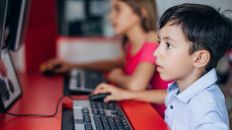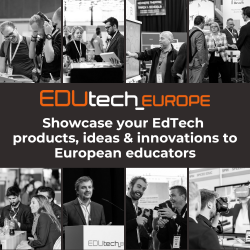As we step back and start evaluating the state of education, where can we move forward and what should we retain? We got our EDUtech community to contribute, voting on their top issues for 2022. From personalised learning to the importance of a growth mindset in developing future-ready graduates, take a look at what’s shaping the year ahead.
Assessments
What is the purpose of assessments? A majority of schools relied heavily upon summative assessments to gauge student learning. However, the prolonged period of distance learning has made summative assessments challenging but also provided an opportunity for innovation and an evaluation of current methods. Formative, project-based, digital, there is room for exploration of different types. It has also recentred the purpose of assessments to focus on the student, and the value it brings to learning.
Blended Learning
Where digital meets traditional, blended learning combines the best of physical classroom activities with the opportunities presented by huge developments in EdTech. The key to continued schooling, blended learning presents the opportunity for students to learn even during times of uncertainty. Anchored in pedagogy and guided by key learning outcomes, this delivery model cultivates a sense of independence in students and a degree of personalisation. This could be the permanent fixture in all schools in the time to come.
Cybersecurity and Data protection
Whilst it is important to embrace the digital age and design digital schools and campuses, security and protection are critical. Institutions are easy targets of hackers. As more teaching and learning takes place in the digital space, stronger cybersecurity efforts are needed to ward off attacks.
Humans continue to be the weakest link in cybersecurity – Tan Shui-Min, National University of Singapore
Digital literacy and wellness are also of growing importance. Equip staff and students with the know-how and skills to prevent attacks and make online learning a safe place for all.
Emerging Technologies
Emerging Technologies that help connect students to purposeful learning across physical, social/emotional, affective/creative and cognitive domains for survival, sustainability and a sense of belonging. – Susan Ledger, University of Newcastle
Artificial Intelligence (AI), machine learning and big data are just some of the emerging technologies making their way into education. They enable smarter and more effective teaching and learning, and also organisational management. From adaptive learning to different profiles of students to institution administration and advancing research efforts. This reality is not far away considering the steps education has taken in the past two years.
Extended Reality (XR)
“XR can span distances, enable self-paced and individualized learning, and transport students to environments that are impossible to visit in the physical world.” Artificial reality (AR), virtual reality (VR) and mixed reality (MR) allow students to engage with learning materials in a deeper, realistic manner. It also makes skills learning more accessible away from a physical space and make training easier for teachers.
Future-ready Skills and Development
As the world and economy develop at an exponential pace, schools are challenged to equip students with timely skills and knowledge. How can we produce future-ready, career-ready graduates? What sort of skills are required to thrive in a society that is changing every second?
“It’s going to be a skills and competencies-based economy, it’s not going to be an information-defined economy. It’s about the ability to manipulate and process information and do things with it, that’s where the education system needs the shift in training that ability in kids and the most important of all is developing the growth mindset. The ability and the willingness for children to want to learn for the rest of their lives, read, seek knowledge and teach themselves over and over in their lifetime.” – Nadiem Makarim, Minister of Education, Culture, Research and Technology, The Republic of Indonesia
Microlearning
Make learning a self-driven exercise. With the wealth of digital resources and content available from a variety of reliable sources, bitesize lessons and courses have become a staple of education from K-12 to Higher Education. In K-12, short videos assist in knowledge-sharing in a blended learning model, maximising class time for collaboration and interaction. In Higher Education, microlearning can be the path to being workforce-ready with timely skills.
Personalised Learning
Each and every student deserves a quality education. However, with limited time and resources, every teacher is challenged to speak directly to each students’ habits and preferences. Tailor learning to each student by collecting data on their behaviours and adapting lesson delivery to help them excel and achieve greater learning outcomes.
Make use of data for early detection and intervention for assisting students in needs – John Hui, The Education University of Hong Kong
In 2022 we will be continuing letting students choose how they access some content, how they organize their learning and how they exhibit it … Schools are key players in scaffolding learner autonomy by offering personalised learning opportunities with the support of technology to harness the power of their agency. – Daniela Silva, Education in Motion
Professional Development
We can achieve more with a digital school, but not without equipping our teachers with the necessary skills and knowledge. It’s not just about the tech, it’s about people, getting them onboard with digitalisation and enabling them. Developing teachers’ digital competency is critical at this stage as we look forward to bringing education into the digital age.
Partnerships and collaborations with technology enable greater knowledge and resource sharing by breaking physical boundaries and expanding school leaders’ awareness of major trends, challenges and solutions. Strategic partnerships with vendors, industry and other learning-focused organizations can bring superior learning opportunities for the learners and a higher positive impact to the near and expanded community. – Daniela Silva, Education in Motion
Wellbeing, Social and Emotional Learning
Empathy, grit, persistence, flexibility and adaptability are core skills for our students, their parents and our educators during crisis management. – Daniela Silva, Education in Motion
This period of uncertainty has highlighted gaps in social and emotional wellbeing efforts in institutions. Moving forward, how can schools take a holistic and strategic approach to not only educating students and educators on well-being but also developing processes that are attentive to well-being needs.
As part of our community, we want you to tell us what’s shaping your classroom today. EDUtech Show & Tell showcases our community’s innovative ideas. These bitesize, 15-minute videos shines the light on teaching with technology. Submit your Show & Tell and stand a chance to be featured on EDUtech_talks and at an upcoming EDUtech event.






